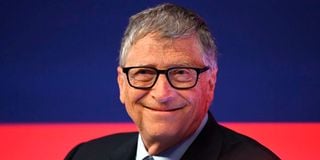Premium
Bill Gates seeks to correct ‘vaccine injustice’ against Africa by producing at scale

American business magnate Bill Gates.
Bill Gates, co-chair of the Bill & Melinda Gates Foundation, has announced Sh6 billion ($40 million) in new investments to advance access to mRNA research and vaccine manufacturing technology. This, he says, will support the capacity of low- and middle-income countries (LMICs) to develop high-quality, life-saving vaccines at scale.
This comes after the Foundation transferred the first prototype of the mRNA technology to AFRIGEN in South Africa, a company it says meets the criteria that could make these vaccines cheaply, with a dose of the vaccine in final form costing less than Ksh300.
Making the announcement on Monday at the 2023 Grand Challenges Annual Meeting, which is taking place over the next three days in Dakar, Senegal, Mr Gates said the move builds on lessons the foundation has learned from more than 20 years of working with vaccine manufacturers in LMICs and the opportunity to leverage recent scientific advances to develop low-cost, high-quality health tools that reach more people around the world.
“mRNA technology is seen as a potential game-changer for a number of infectious diseases, including tuberculosis, malaria and Lassa fever, which disproportionately affect people in LMICs. This new technology can significantly reduce the cost of mRNA research and production and enable wider access - helping to fill critical gaps,” he said, drawing lessons from the Covid-19 pandemic.
"The sense of urgency for Covid-19 should be applied to diseases that aren’t a major problem in rich countries. The same techniques used to deal with coronaviruses can be applied. Without cutting corners, we need to look at high-impact interventions and get them out there as quickly as possible”.
“Global health research and development (R&D) deserves more funding. Less than five percent of all R&D goes to the diseases that kill by far the most children, and the best way we can celebrate 20 years of the Grand Challenges Annual Meeting is to continue to focus on the world’s toughest problems with the most innovative solutions,” said Gates, highlighting malaria.
“mRNA vaccines have simpler research and manufacturing processes than traditional vaccines, so expanding access to this next-generation technology can help African countries like Senegal and South Africa gain the autonomy to discover and develop low-cost, high-quality vaccines for diseases like malaria and tuberculosis that meet their health priorities.”
The Foundation had invested in mRNA technology ten years ago with the aim of realising an HIV vaccine, but then the pandemic happened, forcing scientists to see if they could use the same technology to produce Covid-19 vaccines in ten months, and it worked.
Quantoom’s modular mRNA technology addresses common bottlenecks in current mRNA research and manufacturing technologies, making it easier and cheaper to use. For example, Quantoom’s platform could reduce the cost of producing a vaccine by more than 50 percent compared to traditional mRNA technology. It could also significantly reduce the need for highly trained experts, which remains a barrier to vaccine production in Africa and elsewhere, while maintaining or even improving the quality of the product.
It is perhaps for this reason that Mr Gates has announced a total of $40 million in funding to accelerate access to Quantoom Biosciences’ low-cost mRNA research and manufacturing platform, which was developed with a Grand Challenges grant to its parent company, Univercells.
Institut Pasteur de Dakar (IPD) and Biovac, research institutes with vaccine manufacturing experience in Senegal and South Africa, will each receive $5 million to acquire the technology and use it to develop locally relevant vaccines.
“To further advance the technology and lower the cost of commercialisation, the foundation will also provide $20 million to Quantoom Biosciences to ensure that LMICs can benefit from the next generation of mRNA health tools. The Gates Foundation will provide an additional US$10 million to other LMIC vaccine manufacturers to be named,” said the foundation co-chair. This new funding builds on the foundation’s previous $55 million investment in mRNA manufacturing technology.
In an interview with the Nation on the sidelines of the annual meeting, Trevor Mundel, who heads the foundation’s global health group, which works on vaccines, new drugs, new therapeutics, data science and artificial intelligence, with a focus on Africa and South Asia, agrees with Mr Gates.
“When I got the chance to take this position at the Gates Foundation, which was sooner than I thought, I jumped at the chance because we need to address some of the big problems in health at the public health level, especially in Africa, from HIV to malaria to tuberculosis and also nutrition.
We saw tremendous injustice during the Covid-19 pandemic, we were very involved with vaccines and trying to set up Covax, which ultimately didn’t produce vaccines for Africa,” he recalled.
“And we actually transferred the first prototype effect of mRNA technology to AFRIGEN in South Africa, a unit that meets the criteria that could make these vaccines very cheaply.

Covid-19 mRNA vaccine production platform. Pharmaceutical manufacture background. Macro scene of automatic conveyor line
According to Dr Muhammad Ali Pate, Nigeria’s Coordinating Minister for Health and Social Welfare and a global expert on vaccines, putting innovative mRNA technology into the hands of researchers and manufacturers in Africa and around the world will help ensure that more people benefit from the next generation of vaccines.
“This collaboration is an encouraging step that will improve access to critical health technologies and help African countries develop vaccines that meet the needs of their people.”
Dr Amadou Sall, CEO of IPD, echoed Dr Pate’s sentiments. “Expanding our capacity to discover and manufacture affordable mRNA vaccines in Africa is an important and necessary step towards vaccine self-sufficiency in the region.
We welcome this new funding, which will support the development of life-saving technologies on the continent, while also contributing to global health security by expanding the supply of and access to vaccines - allowing us to achieve greater global health equity.”
For Morena Makhoana, CEO of Biovac, innovation can be transformative, but only if it reaches the people who need it most. “This collaboration will help fill critical gaps in access to promising mRNA vaccines against diseases that disproportionately affect the world’s poorest. It will also help us in our mission to build end-to-end, large-scale vaccine manufacturing capacity in Africa for global supply.”
José Castillo, CEO of Quantoom Biosciences, said the development of new vaccines is costly, resource intensive and concentrated in high-income countries.
“We are excited to partner with IPD and Biovac to scale our technology in Senegal and South Africa and help increase access to novel mRNA vaccines - one of the most promising new tools in medicine.”
The additional funding for Quantoom builds on an initial grant awarded to Univercells in 2016 in response to a Grand Challenges call for new interventions in vaccine manufacturing, according to the foundation.
“Univercells’ proposal focused on developing modular design principles that would facilitate decentralised, small footprint vaccine manufacturing.”
“IPD plans to begin producing essential measles and rubella vaccines using Univercells’ original vaccine manufacturing technology, expanding the region’s capacity to conduct routine immunisation campaigns,” said Gates, who visited IPD on Sunday.





